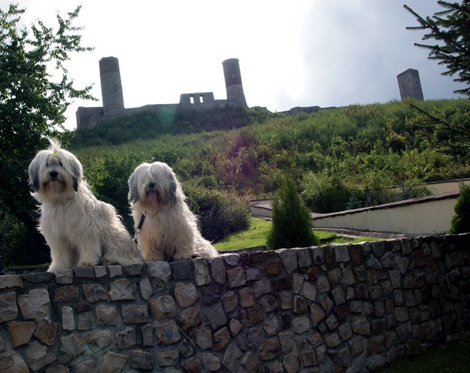PONS who bark when they
are left alone may be
exhibiting a form of
separation anxiety. The
more lonely they are,
the more they tend to
bark. The more upset
they become, the more
they bark and their
barking gets them more
upset and unfortunately
they bark more.
This cycle continues on
and on.
PON owners
need to work with their
PONS on the underlying
behavior of separation
anxiety. This can take
place with several
approaches. Sometimes,
professional advice may
be needed.
Owners can begin by
leaving or acting like
they are leaving for a
short time( before the
PON starts getting
nervous and barking )and
returning. Following
this approach, owners
are not rewarding
barking, but rewarding
relaxation and silence.
Owners may gradually
extend the time they are
gone and return before
their PON becomes
anxious. If a PON is
anxious even after the
owner leaves the room,
then the owner will need
to start by just taking
several steps away from
her PON while she
remains relaxed. Owners
need to develop this
behavior modification
very slowly.
As owners, we may
need to change our
habits. Very often our
PON becomes nervous when
they notice our routine
of leaving the house.
Change your routines
until your PON does not
pay attention to your
daily schedule. It is
also vital to avoid give
your PON lots of
attention when you plan
on leaving the house.
While you are away,
make sure your PON is
kept busy with a
radio, toys ,etc. Make
sure you give your PON a
lot of exercise about
half an hour before you
leave. As with boredom,
tired PONS are less apt
to become anxious when
home alone.
If your PON tends to
not only bark, but
destroy things while you
are gone, a crate may be
necessary. Never punish
your PON when you come
home and find something
chewed or torn. If you
do, your PON will soon
associate your return
with being punished.
That is going to make
her even more anxious.
Remember that PONS have
long memories.
During the time you
are working on behavior
modification, it may be
helpful to get a pet
sitter to come in
several times during the
day. This will help
break up the long hours
your PON experiences
while you are away from
home.
If
separation anxiety is
severe, meds may be
needed during your PON's
behavior modification
process. However,
medication may not solve
your PON's problem, but
it can be a useful part
of the process. Consult
with your veterinarian
to determine which
medication would be most
appropriate for
separation anxiety.
Consider natural
alternatives in all
situations. Good luck.

